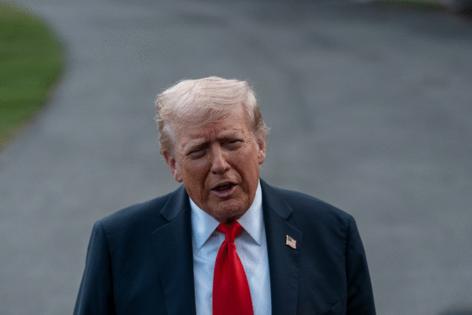Trump suggests no need for another 'big, beautiful bill'
Published in Political News
WASHINGTON — President Donald Trump potentially closed the door to another reconciliation bill Tuesday, telling Republican senators at the White House that this summer’s “big beautiful bill” contained “everything” he desired and that no additional legislation is necessary.
Soon after the reconciliation package became law in July, Speaker Mike Johnson touted plans for passing two more such measures to expand on the Republican agenda without the risk of a Senate filibuster.
But Trump appeared to dismiss the need for that effort in televised remarks at a Rose Garden lunch that was designed partly to show GOP unity as the partial government shutdown enters its fourth week.
“We don’t need to pass any more bills,” he told the gathering. “We got everything in that bill,” including “the largest tax cuts in history. We got the extension of the Trump tax cuts. We got all of these things.”
Any chance of a second reconciliation bill would depend on how much Trump wants it, since his pressure would likely be necessary to round up enough Republican votes.
And the cards were already stacked against the effort, given the amount of time and energy that completing fiscal 2026 appropriations was going to take — a task that has only grown larger as a result of the partial shutdown.
But Trump’s comments Tuesday could dampen whatever hopes Johnson still has of passing additional reconciliation measures. “We have additional reconciliation bills,” the Louisiana Republican said before the August recess. “We have one planned for this fall, and one hopefully for next spring.”
Senate Majority Leader John Thune said in the past he was open to a second reconciliation bill, but the South Dakota Republican has not made any commitments.
Long odds for Round 2
Even before Trump’s remarks, there was a lot of skepticism about Republicans’ ability to pass another reconciliation bill with narrow majorities in the House and Senate.
Another reconciliation bill would require not one, but two, additional “vote-a-rama” sessions: marathon voting sessions with unlimited amendments, first for a budget resolution containing reconciliation directives followed by the legislation itself. And senators may be loath to take up politically charged amendments as they prepare for next year’s midterm elections.
And before that could happen, House and Senate Republicans would have to unite around a new agenda for a second reconciliation package after narrowly passing the last one.
The “big, beautiful bill” extended expiring tax cuts enacted in 2017, added funds for the border and defense, repealed green energy tax credits and cut more than $1 trillion in spending over 10 years, among other things. It passed by one vote in the Senate, with Vice President JD Vance breaking a tie, and 218-214 in the House, where two Republicans joined all Democrats in voting against it.
Earlier in the summer, House Budget Chairman Jodey C. Arrington, R-Texas, advocated another reconciliation effort, saying that with more time, the bill could be written to include provisions such as reducing the federal Medicaid match for states that provide coverage to undocumented immigrants in a way that does not violate the Senate’s Byrd rule, which restricts what can be considered under reconciliation. That and other provisions were struck from the legislation that passed this year after consultations with the Senate parliamentarian.
House conservatives also have pushed for another reconciliation effort, but it’s unclear what the focus of the legislation would be. And it’s even more questionable whether more moderate Republicans facing reelection next year would support it.
Trump did not use the word “reconciliation” in his luncheon speech and he did not go into detail, so it was still possible he could consider a new package if GOP lawmakers united around one. But his comments suggest that reconciliation is off the table for now.
No mood for negotiating
The president also used his speech to blame Senate Minority Leader Charles E. Schumer, D-N.Y., for the partial shutdown. Schumer has led Democrats in demanding an extension of expiring health insurance subsidies as a key condition for reopening the government.
“Unfortunately, in a craven and pointless act of partisan spite, Chuck Schumer, who I have known for a long time, and the radical-left Democrats are holding the entire federal government hostage to appease the extremists in their party, and they are extreme,” Trump said.
Schumer on Tuesday pushed back on similar criticism leveled against him by Thune on the Senate floor before the White House lunch.
“What the heck is he talking about? How is it ‘far left’ to say we want lower health care premiums and to spare tens of millions of people from financial ruin?” the New York Democrat said.
But Trump made clear Tuesday he had no intention of cutting a deal with the minority party to pass a continuing resolution and end the shutdown.
“Our message has been very simple: We will not be extorted on this crazy plot of theirs,” he said of Democrats. “They’ve never done this before. … You always vote for an extension (of funds). Chuck Schumer and the Senate Democrats need to vote for the clean bipartisan CR and reopen our government. It’s got to be reopened right now.”
______
©2025 CQ-Roll Call, Inc., All Rights Reserved. Visit cqrollcall.com. Distributed by Tribune Content Agency, LLC.
























































Comments